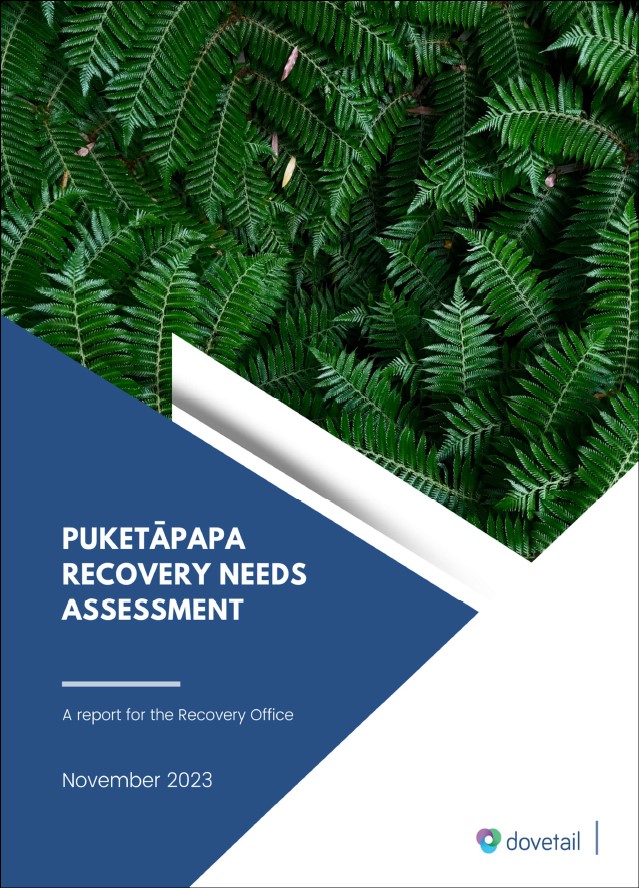Puketāpapa recovery needs assessment
Author:
DovetailSource:
Dovetail, Tāmaki Makaurau Recovery Office, Auckland CouncilPublication date:
2023Topics:
Environment ,PeopleExecutive Summary
The Puketāpapa Local Board area was significantly impacted by two weather events in early 2023. A strong community-led response involving many local community groups and businesses activated quickly to meet the wide-ranging needs of affected residents.
It is recognised that ongoing needs remain in the community as a result of these events, with the Recovery Office at Auckland Council seeking to capture these via a needs assessment. This document details findings from the mixed methods research study undertaken to inform this work.
Support provided during the response generally involved an amplification or extension of existing services and incorporated a wide range of activities, including the provision of food and accommodation, information sharing, distribution of household goods, and the clean-up of homes.
Much of the response work was led out of a hub established at Wesley Primary School, with other aspects delivered independently at other locations across Puketāpapa. There were a range of factors identified as having worked well in the community-led response, including:
- The central hub established at Wesley Primary School, with its size and wide range of facilities available, location within a trusted school, and well organised systems highlighted as key assets.
- Strong collaboration across a range of actors facilitated sharing of resources and information, good communication between different stakeholders, and effective joined up working.
- An extensive and rapidly mobilised volunteer network played a key role in managing the flow of donations, establishing operational systems, and undertaking practical activities.
- The flexibility of leaders and organisations which adapted their ways of working or introduced new approaches worked well, alongside the network relationships with key decision makers which were drawn on to expedite support during this time.
- Skilled, well connected, and trusted community leaders with a range of relevant skills and expertise were effective in engaging local residents, and social media facilitated the dissemination of information and engagement of support.
While the response in Puketāpapa was viewed as exemplary in many ways, the research identified some challenges. These included meeting diverse ethnic, cultural and accessibility community needs, resourcing constraints, and the health and well-being of those involved in the community-led response. A lack of overall coordination of the response resulted in some inefficiencies and a chaotic environment at times.
Community stakeholders reported that there are significant ongoing needs in the community, linked to issues that have either not been resolved from the immediate aftermath of the flooding, or have developed since this time. It is believed that the weather events exacerbated existing needs in the community, and that the nature and extent of needs may not be fully known given that some residents face barriers in seeking assistance. Key recovery needs identified included:
- Mental health and wellbeing needs were linked to a range of issues including ongoing trauma from the events, anxiety about future adverse weather occurrences, stress in addressing the impacts of the events, isolation and loneliness, and grief.
- Support with family and relationship stressors was associated with overworked and stressed parents struggling to meet ends meet and people living together in sub-optimal housing conditions.
- Housing and accommodation needs involves families forced to leave their properties due to flooding which has resulted in some living in accommodation which is not fit for purpose, a loss of family and other support networks, overcrowding, and psychological impacts as a result of housing instability. Some families are still living in damaged properties that they cannot afford to repair.
- Meeting basic household needs, such as food and accommodation costs, remains difficult for some due to financial pressures.
- Unresolved insurance claims are adding to an already stressful situation, with language barriers and a lack of evidence to support claims creating additional challenges.
- Access to information and support is restricted due to a lack of awareness of support options, confusing or complex pathways to help, language barriers, a lack of documentation, and a reluctance amongst some residents to ask for help.
- Infrastructure needs relate to ongoing problems with water or drainage systems, and paths or roads, with concerns raised about the capacity of current systems to withstand future adverse weather events.
Community organisations have taken on a number of roles as part of recovery efforts, including: connecting community members to services and support options; providing space to socialise, gather and connect; delivering community events as means of reducing isolation; supporting families to meet basic needs (e.g. via food parcels); providing formal and informal psychological support; and contributing to planning efforts for future adverse weather events.
Longer terms concerns regarding local area risks include anxiety about the overall safety of the area, a lack of community preparedness for future weather events, infrastructure capability, redevelopment and intensification, and threats to the natural environment. When considering Auckland Council’s future role in recovery efforts, community stakeholders are seeking streamlined, ‘joined up’ systems, improved engagement and communication, and enhanced infrastructure and planning. They also wish to see that their work is valued by council, and sufficiently resourced to enable them to continue to carry out their recovery work.
Dovetail, Tāmaki Makaurau Recovery Office, Auckland Council
November 2023
See also
Wellbeing recovery plan for Tāmaki Makaurau. September 2024
*****
Community and social recovery needs assessment: summary report 2024
Māngere recovery needs assessment 2023
Waitākere Ranges resilience planning 2023
West Auckland emergency response study 2024
West Auckland recovery needs assessment 2023
Knowledge Auckland: Other storm recovery documents
Auckland Council website:
Recovery from extreme weather and natural disasters
